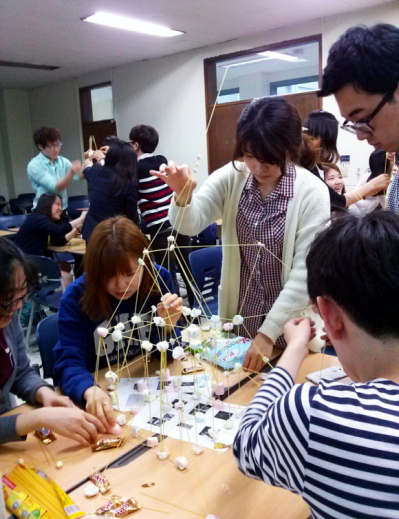
Soft Brain is an inventor club at Ewha that is affiliated with the Korea University Invention Association. It was founded in 2008 as one of the university-wide recognition student clubs that provide an opportunity for inventors to share inspiring, novel ideas and thoughts. The club was established under the name of Soft Brain with the meaning to interface a particular object or phenomenon with cognitive flexibility. Currently, 16 Ewha students are actively participating in Soft Brain.
The members try to focus on identifying and satisfying unmet needs of an increase in quality and efficiency of resources. Students decided to center on the invention’s functionality by devising realistic ideas that can actually improve convenience and efficiency in people’s ordinary lives.
“We usually make a first priority on the things we feel uncomfortable about and that need solutions,” said Kang Ji-won (Chemistry & Nano Science, 2), the current president of Soft Brain. “More people are likely to use the inventions that suggest solutions to the various problems people face in their lives.”
Every year, the members prepare for the University Invention Contest and they hold special invention exhibits of their ideas. The team is replete with ideas by the cyclic process of meeting and mating of ideas to originate new ideas. Their most recent invention is the “string stapler,” which is an invention that helps to fix folded shirtsleeves and pants from rolling down. The string fixes the clothing by functioning like a stapler that fastens sheets of paper together.
Some of the other creative inventions include “manicure in remover,” “bus handle” and “backpack with division of space.” All of these inventions have derived from the effort and inspiration to relieve minor but crucial discomfort people feel in their daily lives.
Students believe these ideas stem from their belief that invention knows no frontiers.
“We define creativity as the ability to perceive something from different angles,” Kang said. “It is a skill to generate new ideas that others have not come up with.”
Throughout the process of inventing new products, there are no major difficulties for the members since they do not have the compliance to invent something new.
“However, we do get a little stressed when we try to think of more creative ideas as the invention contest date gets closer, but it also acts as an incentive for fostering innovation in developing useful products,” Kang said. “We feel worthwhile when we invent products, and the degree of feeling worthwhile increases when we receive more recognition and positive responses from others. We plan to continue preparing for contests with specific ideas that focus on the product’s efficiency.”
Soft Brain is an organization where all Ewha students are eligible to join. The club is open to everyone to gather, think and share ideas to seek and meet the real needs of people.
“Many students think invention is difficult and something that they cannot do but in fact, anyone can invent a product only if they have a little interest in it,” Kang said. “We hope to pursue further development and create awareness to Ewha students that invention is really not as difficult as people think.”
Ewha Voice
evoice@ewha.ac.kr

